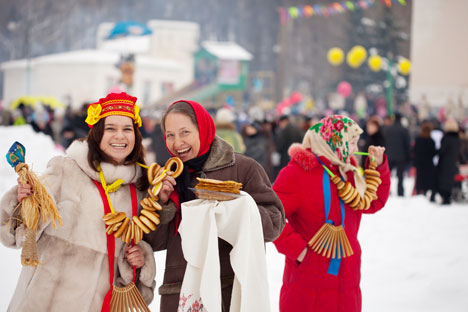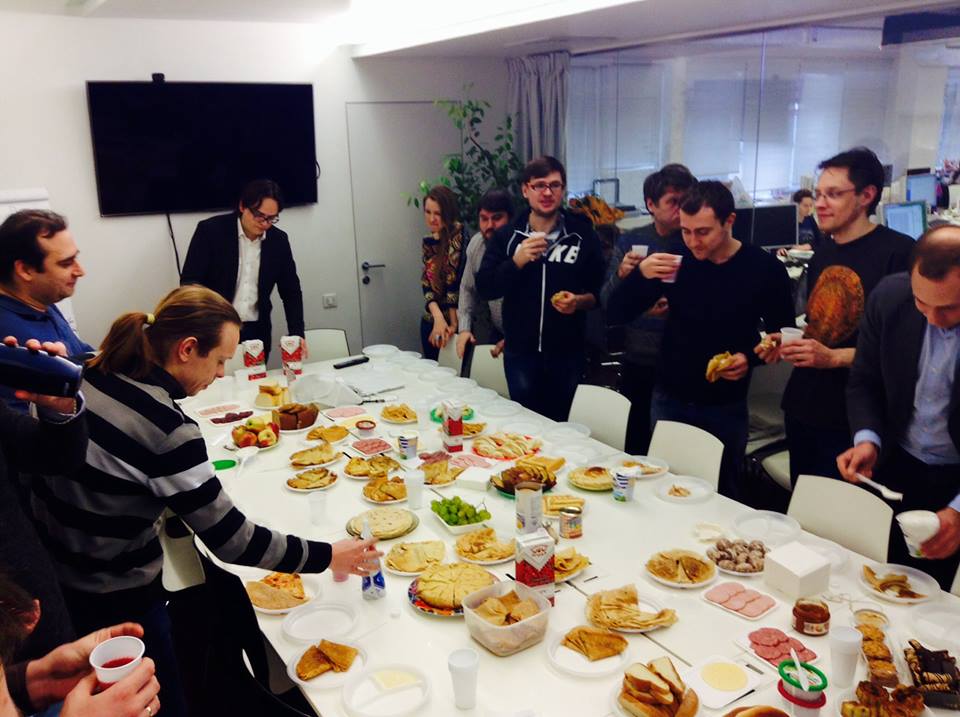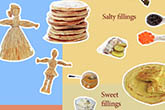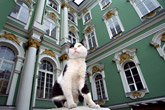Discovering Russian culture in the U.S.: Feb. 21 – March 6

People celebrate Maslenitsa in Moscow. Source: Lori / Legion Media
On Saturday, Feb. 21, Maslenitsa (Shrovetide) week is almost over, but you still have time to organize a pancake party for your family and friends. In ancient times each day of this week had its own traditions, and Saturday was the day when young women entertained their husband’s relatives and gave them presents. Shrove Sunday is the final day of Maslenitsa – on this day people gathered outside and burnt a straw doll representing winter, young boys and girls jumped over the fire and everyone asked each other for forgiveness.
The RBTH team has prepared a video-recipe of blini s pripyokom for you (which means literally “pancakes with filling”) and also an interactive infographic that will answer all your questions about Russian pancakes.
Sunday, Feb. 22 is also the birthday of the first President of the United States, George Washington. And if you live in Washington D.C., which is named after him, we suggest you take a tour of Russian sites in the American capital. The Russian footprint in D.C. may not be as prominent as in New York City, but there are some cultural centers, churches, and borscht joints, as well as diplomatic hot spots and other must-see locations for any Russophile.
Those who live in the New York metropolitan area are also invited to attend concerts of Russian classical music. On Feb. 23, the John F. Kennedy Center for the Performing Arts will host soprano Renée Fleming and Olga Kern – a Russian classical pianist who now lives in New York. The program includes works by Rachmaninoff, Schumann, Strauss, and others.
On Feb. 27 you can visit a concert by the Russian Chamber Art Society in Washington, DC. This concert series is dedicated to Russian chamber vocal music that is rarely performed in the United States. The concerts are organized by the pianist Vera Danchenko-Stern, who graduated from Moscow’s prestigious Gnessin Institute of Music in piano, solo performance, chamber music, vocal, and instrumental accompaniment. She has lived in the United States since 1990 and has also been teaching the “Singing in Russian” class at the Peabody Institute of the Johns Hopkins University.
Monday Feb. 23 is a day off in Russia because of the Defender of the Fatherland holiday, which commemorates the creation of the Soviet Army. These days, however, it is traditionally observed around Russia by men of all ages.
In RBTH’s Moscow office our men have already had a party, which we combined with Maslenitsa, but even in the U.S. you can congratulate your father, brother, boyfriend or husband in Russian style. Although men say they prefer creative or useful gifts, the most common gifts are cologne and socks.

RBTH men celebrate Maslenitsa and the Defender of the Fatherland holiday. Source: Elena Bobrova
Monday, Feb. 23 also marks the beginning of Lent for Russian Orthodox believers. This year you can read the blog written by Lara McCoy, RBTH’s Executive Editor for the Western Hemisphere, which will cover the challenges of following the strict fasting rules of Lent, including fast-appropriate recipes and notes about the religious traditions behind the season.
But if you happen to live in New Hampshire, you can take a course in icon painting in the city of Dover. Russian master iconographer, teacher and lecturer Marina Forbes will offer four three-hour sessions from 1:00p.m. to 4:00p.m. on March 1, 8, 15 and 22. No painting experience is required for these lessons.
On Feb. 26, as part of Black History Month in New York, Moscow 57 will present its first stage musical about Frederick Bruce Thomas, the son of former slaves, who became Moscow’s king of nightclubs, known as The Sultan of Jazz. The musical is based on the book The Black Russian by Vladimir Alexandrov, who grew up in New York City in a Russian émigré family.
Those new Yorkers who are interested in political discussions about Russian-Ukrainian relations, Russia's different peoples and gender problems can choose from many events in February and March at the NYU Jordan Center for the Advanced Study of Russia.
Sunday, March 1 isn’t only the first day of spring, but also Cat Day in Russia (though National Cat Day is celebrated in the U.S. on Oct. 29). In January, a corpulent Russian cat named Masha became a real hero in the Russian and American press, including the Washington Post.
Masha used her own body to shelter an abandoned infant from the winter cold in the city of Obninsk, 65 miles from Moscow.
Other famous cats in Russia include those that live in St. Petersburg’s State Hermitage Museum. Cats have resided in the Hermitage since the time of Empress Elizaveta Petrovna. In 1747, she issued a decree arranging for a chauffeur to bring “house cats suitable for catching” to the Winter Palace. A carriage full of Russian Blues was ferried posthaste from Kazan to the imperial residence in St. Petersburg. In 2007 American writer Mary Ann Allin wrote a children’s book about the Hermitage cats, which she discovered in 2005 while visiting the museum with her granddaughter Anna.
From March 4-22, meanwhile, New Yorkers can go to the theater performance “KNOCK: A Journey to a Strange Country” – a play inspired by early Soviet-era surrealist and absurdist writer Daniil Kharms.
The play continues a trend of absurdist-inspired international productions in New York City’s modern Off-Off-Broadway scene, combining Jewish sensibilities with the best of classical Russian/Stanislavsky theater.
Read more: Week in review: Many sides to a love-hate relationship>>>
All rights reserved by Rossiyskaya Gazeta.
Subscribe
to our newsletter!
Get the week's best stories straight to your inbox

